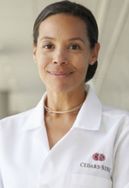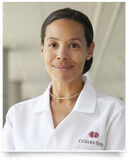Guest Post: Lynn’s 5 Lessons Learned for Complex Mitral Valve Surgery
Written by: Adam Pick, Patient Advocate, Author & Website Founder
Published: April 22, 2024
I’ve said it before and I look forward to saying it again…
Hearing from patients about their heart valve success stories remains my favorite part of running this website. For example, here is a fantastic patient story from Lynn Friedman who overcame a very complex form severe mitral regurgitation thanks to Dr. Joanna Chikwe, Dr. Dominic Emerson and the entire team at Cedars-Sinai Medical Center in Los Angeles.
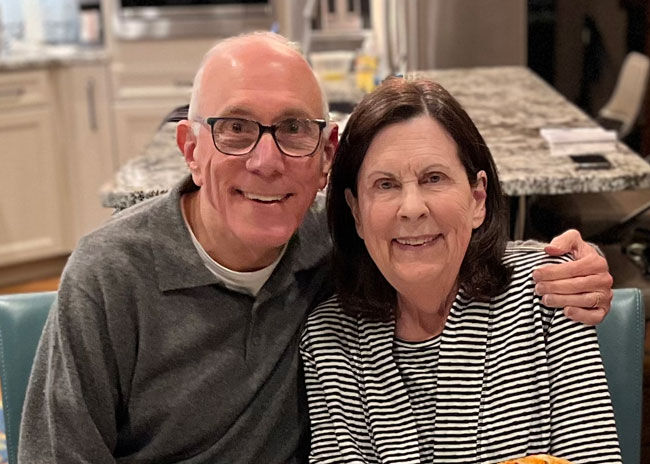
My Diagnosis & My Symptoms…
I am 73 and live in Chicago. I was diagnosed on December 19, 2023 via a Transesophageal Echocardiogram (TEE) with severe mitral valve regurgitation due to severe P3 and P2 prolapse. I was extremely fatigued and short of breath on very mild exertion.
A Delayed Surgery?
I have rheumatoid arthritis and receive an infusion every six months to keep it under control. The doctors advised me not to have surgery too close to one of my infusions, so the earliest I was eligible for surgery was mid-March. That delay turned out to be a blessing, because it gave me time to do a lot of research on mitral valve surgery, the best surgeons, the best hospitals, and consult with various surgical teams.
A Concerning Complication… Mitral Annular Calcification
My tests revealed significant Mitral Annular Calcification (MAC) around the mitral valve. Through extensive research my husband and I did, and feedback we received from several heart surgeons, I learned that the calcium makes it very difficult to fix the mitral valve. Attempting to remove the calcium can be dangerous, potentially causing a stroke or worse during surgery. We spent many sleepless nights from diagnosis through surgery not knowing whether my mitral valve could be repaired adequately, and whether replacing the valve would be safe or not. I was told that replacing my mitral valve would be inherently riskier than a repair due to having to “mess with the calcium” in order to get the new valve to seat properly, not to mention other disadvantages of a replacement vs. a repair.
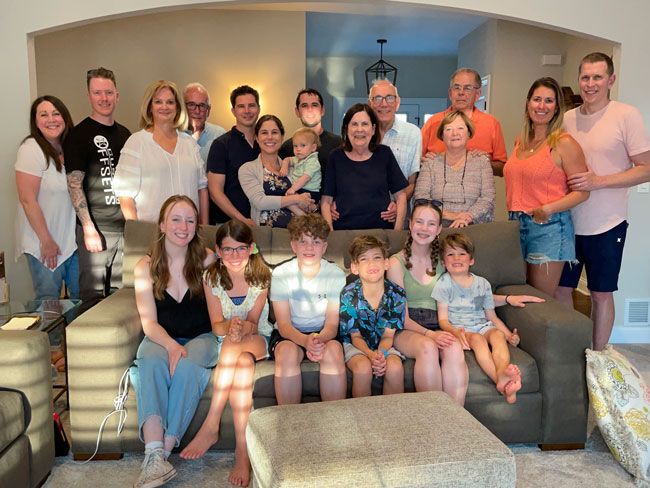
I Consult With 3 Different Surgeons
We sent my test results to three well-known surgeons at three renowned heart hospitals for an evaluation. The first one said that the mitral valve could be repaired robotically, but it would have to be an “imperfect” repair due to the MAC. I was told my severe regurgitation could be reduced to somewhere between mild-moderate, and that a replacement would be even more problematic than a repair.
The second consult was adamant that my mitral valve could not be repaired, and that a replacement, at significantly more risk due to the MAC, was the only solution. I was also told that moderate regurgitation as an outcome of surgery would be foolish to accept, and that I should consider an open-chest (sternotomy) operation.
The third consult was also from a well-known robotic surgeon at a top-rated hospital. I was told the mitral valve could not be repaired due to the MAC, and that they do not do replacements robotically. Their only suggestion was to contact a surgeon who would replace the mitral valve via a sternotomy. My husband and I were discouraged beyond words, and felt we did not have a good choice between any of the three consults.
We Found Our Surgical Team!
After my third consult, I was ready to give up on my hope for a robotic repair. Thank goodness my husband made one last call, to the office of Joanna Chikwe, MD, Chair of Cardiac Surgery at Cedars-Sinai Medical Center in Los Angeles. His first question to the staff: “Does Dr. Chikwe do replacements robotically, or only repairs?” He was told she can do either one with the robot, but it would depend on a review of my test results and images. They setup an account for me on their online medical record system while my husband was still on the phone, and by that afternoon my husband had uploaded all of my tests to Cedars-Sinai. Three days later, I received a call asking if I could meet with Dr. Chikwe in two business days for a video consult.
Her consult was the only one that gave us hope. She said she was “reasonably confident, but not certain,” that a robotic repair could be achieved, and that based on my test results, a robotic approach should be reasonably safe for me. She said the repair would not close the leak completely due to the calcium, but she thought she could get it to mild. If she could not get it to mild, or if there were signs that the repair would not be durable (long-lasting), she said she would make a decision during surgery to replace the mitral valve.
Dr. Chikwe said if she had to do a replacement, she would try to use the robot, but that I might wake up with a medium sternotomy. Her willingness to try for a repair, and switch to a replacement, either robotically or via sternotomy, based on what she learns during surgery, was exactly the approach we wanted, and is what set her apart from the other surgical consults described above. She was extremely compassionate and honest about the risks involved. When she expressed “reasonable confidence” in the results she thought she could achieve, and explained her flexibility to switch gears, if necessary during surgery, we knew immediately that we wanted to be under her care. We are so thankful that she was willing to take my case.
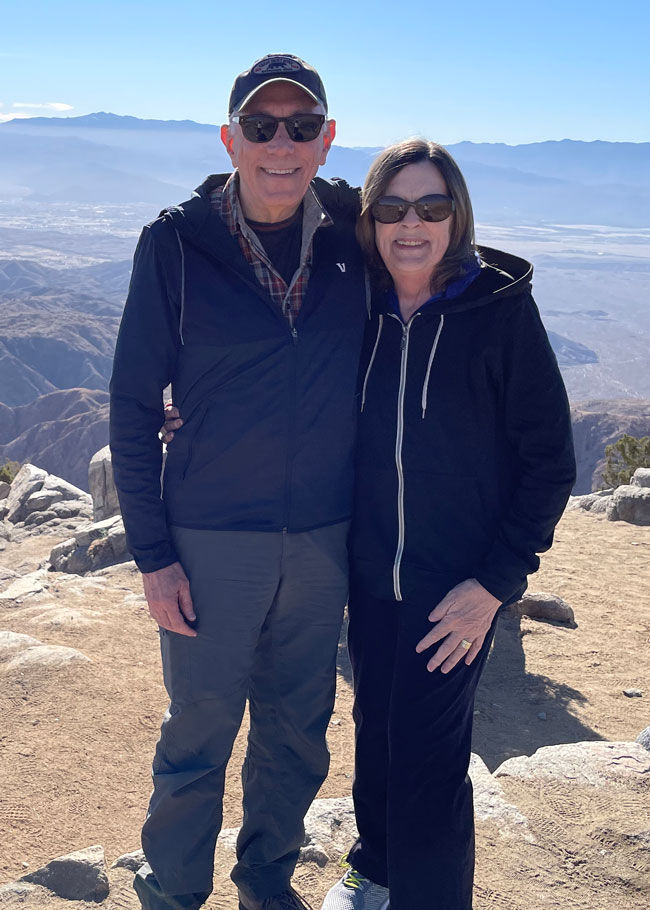
There is a lot of information and many videos about Dr. Chikwe and Cedars-Sinai Medical Center online, like the ones at HeartValveSurgery.com. One in particular that gave us great confidence in her and her team is a speech she gave at the 2023 Cardiothoracic Surgery Symposium. Although it is intended for an audience of cardiac surgeons, it conveys a deep understanding of the critical factors that are essential for safe surgeries and contribute to successful outcomes.
My Surgery
Dr. Chikwe had a top-notch team with her in the operating room. She was assisted by Dr. Dominic Emerson, Director of Robotic Surgery, pursuant to their policy of having two attending surgeons scrubbed for robotic cases. Six or seven others were also in the operating team as part of their team. In my case, Dr. Chikwe was the lead surgeon, but I believe Dr. Emerson was eminently qualified to have been the lead as well.
I knew my case was complex and would present a huge challenge to the surgical team. After surgery, I woke up to learn that the first attempt to repair my mitral valve was suboptimal, resulting in greater than mild regurgitation. There was a discussion amongst the team in the operating room about replacing the valve, and a decision was eventually made to try one more time to enhance the repair.
Thank goodness for the redundancy on my surgical team. Without multiple qualified surgeons in the operating room, such a discussion would not have been possible, and a decision to try for a second attempt at a repair may not have been made. The second attempt was successful, resulting in better than mild regurgitation (some said it was “very little leak,” or “trace-mild”), which is better than what I had hoped for. My surgery was performed robotically, without the need for a sternotomy. They gave me a successful repair without touching the calcium, keeping safety foremost in their minds.
Gratitude for Excellent Post-Op Care
I spent one day in ICU and was then transferred to a regular room.
I was discharged from the hospital after a total of four nights. The care I received in ICU and in my regular room was absolutely outstanding in every respect. Dr. Chikwe came to see me in ICU and every day after that. I was also able to speak with Dr. Emerson and some of the other people who were on the team in the operating room.
Everyone, surgeons, nurses, nursing aids, etc. were so compassionate, caring, and respectful. There are no words to describe the depth of my gratitude for Dr. Chikwe and the team of people she has at Cedars- Sinai.
5 Lessons Learned
There are many important lessons my husband and I learned from this ordeal:
- Lesson #1: If you have a complex case, or even if your case is straight-forward, take the time to research the best surgeons and the best surgical centers. Get more than one opinion. In my case, it took consults with four different surgeons to finally get to Dr. Chikwe – the only team I was willing to trust my life with.
- Lesson #2: If you have MAC, your outcome may not be the same as mine. Every case is different. MAC increases the complexity of any mitral valve repair or replacement. It is critical to have your case evaluated by a center of excellence, like Dr. Chikwe’s team at Cedars-Sinai, that has significant experience with mitral valve surgery in the presence of calcium. You’ll need an experienced team with the technical knowledge of what to do, how to keep you as safe as possible, and the flexibility & willingness to change course based on what they learn during surgery.
- Lesson #3: If you want robotic-assisted surgery, be sure to discuss your case with a surgical center with significant experience doing robotic surgeries. Find out if they have a policy of redundancy in the operating room, where more than one person is qualified to perform the same function. Not everyone qualifies for robotic surgery, and all heart surgeons are not experienced enough to perform it safely.
- Lesson #4: Robotic surgery avoids cutting through the sternum, but it is still open-heart surgery. It is no walk in the park and is not risk-free. In my case, where the surgeon had to delicately work around a significant amount of calcium, I wanted my surgeon to have the best magnified view possible of my heart, and the robot gave her an unparalleled view. Other advantages of the robot were a slightly faster overall recovery, less chance for complications due to not cutting through the sternum, and less scarring. But to me, the primary advantage was the surgeon’s superior view of my heart that I thought might lead to a better surgical outcome.
- Lesson #5: There is no substitute for an experienced team, where each individual has significant experience, and they also have experience working together as a team. It was worth it to me to travel 2,000 miles to have my surgery done by one of the best surgeons, with an outstanding team, at one of the best centers of excellence in the country. It would have been more convenient and less expensive to have my surgery done in my home city of Chicago, but I will never regret the extra effort and money spent to get truly outstanding care.
This is my story, but every case is unique to each person.
I hope this encourages you to do the research and get multiple opinions from experienced surgeons at centers of excellence.
Lynn Friedman
Mitral valve repair patient
